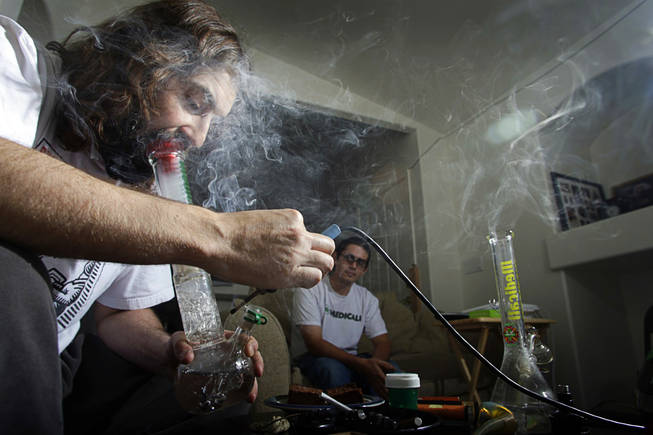
James Parsons, licensed medical marijuana patient and president of Medical Cannabis Consultants of Nevada, smokes marijuana at his home as Licensed medical marijuana patient Justin Martin looks on Tuesday, October 26, 2010. Parsons was one of several Las Vegans who was targeted by the Drug Enforcement Administration and Metro Police in a crackdown Sept. 8 on individuals who grow marijuana for medicinal purposes. Parsons is legally registered with the state to harvest marijuana for medicinal purposes but his business and Summerlin home were raided. To this day he has still not been charged.
Tuesday, Nov. 2, 2010 | 2 a.m.
Reader poll
Related Document (.pdf)
James Parsons still doesn’t know why he and a volunteer employee spent the afternoon of Sept. 8 in handcuffs after authorities raided his medical marijuana consulting business as well as his rented Summerlin home in a crackdown on pot dispensaries throughout the Las Vegas Valley.
“It was just a smash and grab robbery,” Parsons said while collecting the final scraps of his shuttered business. They didn’t touch his financial records, he said, but “they took stuff that I believe they could sell at a police auction.”
The raids confused Parsons, a state-registered medical marijuana user who insists he never sold the drug. And they have exposed what medical marijuana advocates say is a glaring weakness in Nevada’s medical marijuana law — a ban on dispensaries, which they say makes it difficult for many patients with AIDS, cancer or other ailments to buy pot for pain relief and appetite stimulation. Their only legal alternative: grow their own marijuana with a doctor’s prescription. And that raises another weakness in the state law — it says patients can possess marijuana plants, but not the seeds to grow them.
“When the law was passed we tried to have the state grow the plants and distribute the marijuana to patients, but the Nevada Legislature didn’t want to get involved,” said Las Vegas political consultant Dan Hart, spokesman for the group that got the voter-approved law passed in 2000.
The simple solution, advocates say, is to make medical marijuana dispensaries legal in Nevada.
If Parsons gets to prove his innocence — he hasn’t been charged — it would run counter to last fall’s announcement by U.S. Attorney General Eric Holder, who ordered federal prosecutors to lay off medical marijuana patients who are following their state laws.
But because none of the undisclosed number of raids has led to arrests, the acts — conducted by the Drug Enforcement Administration, Metro Police and other agencies — remain shrouded in secrecy. The U.S. attorney’s office will only say that no charges have been filed in connection with the raids and that the search warrants remain sealed.
The Las Vegas raids, following those in other states where medical marijuana is legal, are not necessarily inconsistent with Holder’s announcement because it came with a caveat. Authorities would still make busts if they thought growers and sellers were violating state laws. But where does that leave individuals such as Parsons, who say they are merely law-abiding consultants?
As owner of the federally tax exempt nonprofit Medical Cannabis Consultants of Nevada, all Parsons said he did was offer advice on how to apply for a state medical marijuana registration card, make referrals to physicians who prescribe marijuana, and show clients how to cultivate the plant. He had also planned to sell smoking pipes, herb grinders, hydroponic equipment and other paraphernalia.
“They came after me on the belief I am selling cannabis,” Parsons said. “Wrong. I am a patient resource center. I can’t wait to go to court to prove that.”
But Parsons, 34, has more than a shuttered business on his mind. He’s fighting eviction from his home, brought about after Metro wrote a Sept. 30 letter informing the landlord that he was in violation of a Las Vegas nuisance ordinance because marijuana “was being sold or possessed for sale” at the residence. Parsons is angry, saying he wasn’t arrested or charged with a crime and that he can legally grow pot as a registered patient.
So, he asks, what is the nuisance?
“I’m a legal patient, but I’m considered guilty until proven innocent in this state,” he said. “Every law that Metro can enforce, I’m following. So why does Metro continue to terrorize me and my family?”
Parsons’ friend T. Matthew Phillips, a civil rights attorney who practices in California but lives in Las Vegas, said he generally supports law enforcement but sees no way Metro can defend the letter.
“In my opinion, Metro absolutely cannot do what they’re doing,” he said. “It amounts to extortion.”
But Officer Bill Cassell, a Metro spokesman, said police don’t need an arrest to notify landlords of a nuisance under city code. Definitions of a nuisance include a property that is the subject of a search warrant and a place used to unlawfully sell, manufacture or store a controlled substance.
Cassell also said the letter makes no mention of eviction — saying that’s left up to the landlord. “We are not trying to get anyone evicted,” he said.
Last week found Parsons clearing what was left of his rented office space at 800 N. Rainbow Blvd. He arrived at this point after spending his childhood as a military brat and enlisting in the Marine Corps.
Two hours after the 9/11 attack on the Pentagon, Parsons — who was stationed at Quantico, Va., as a computer programmer — was in a detail of Marines sent to serve as needed. He spent the next two weeks patrolling the Potomac River.
After his honorable discharge in 2002, he moved to Las Vegas and worked in restaurants.
Frustrated by the struggle to find information on the state medical marijuana program and finally locate a Las Vegas physician willing to prescribe the substance, Parsons became a consultant to help others like him. He opened for business in March 2009 and has since helped more than 450 people get state registration. As of August, 2,242 Nevadans had medical marijuana cards, with an additional 165 applications pending.
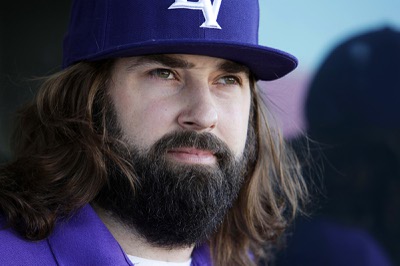
James Parsons, president of Medical Cannabis Consultants of Nevada, poses the business Monday, October 25, 2010. Parsons was one of several Las Vegans who was targeted by the Drug Enforcement Administration and Metro Police in a crackdown Sept. 8 on individuals who grow marijuana for medicinal purposes. Parsons is legally registered with the state to harvest marijuana for medicinal purposes but his business and Summerlin home were raided. To this day he has still not been charged.
After the raid, Parsons and a volunteer employee spent more than three hours in handcuffs, part of it face down on the sidewalk near his business. He estimates 25 to 30 law enforcement officers participated, many armed with high-powered weapons. Agents took his paraphernalia, marijuana plants, computers, assorted paperwork, video games and his Suzuki Reno automobile, he said, adding they knocked a hole in a door while searching inside his business.
He said agents seized no more than eight ounces of marijuana, which is eight times the limit under state law. But Parsons said the law also allows patients to possess more if they can prove it is medically needed and that they have a physician’s approval. Parsons’ doctor permitted him to possess as much as 64 ounces, he said.
“Why would they conduct a paramilitary raid against a disabled United States veteran operating under the law?” Parsons said. “All they should have done is called and asked and I would have met them with everything they wanted at the front door.”
Although the Drug Enforcement Administration, Metro and other agencies involved in the raids have not disclosed the number or identities of individuals or businesses that were targeted, the DEA periodically publishes legal notices in The Wall Street Journal that detail money it has confiscated. The confiscations in Las Vegas the day of the raids included $20,106 from Reynalda Barnett, former owner of Dr. Reefer Institute, $3,549 from the Happiness Consultants and $1,807 from owner John Birmele, $999 from Nature’s Way, and $905 from Organic Releaf. Neither Parsons nor his business were listed, for reasons he does not know.
Under Nevada law, patients may obtain marijuana by growing their own or having a registered caregiver do so. Marijuana dispensaries are legal in California, Colorado, Maine, New Jersey, New Mexico and Rhode Island, but not in Nevada.
But that did not stop numerous medical marijuana consultants such as Parsons from setting up shop in the valley.
Dave Schwarz, executive director of medical marijuana advocacy group Sensible Nevada, said as many as 25 consultants opened shop. He said he thinks some were illegally dispensing marijuana.
“There are patient advocates who say the law is gray and have questioned whether dispensaries are legal but if you take a strict interpretation of the law, dispensaries are illegal,” he said. “We believe the law should be modified to allow for dispensaries.”
When Nevada voters approved the medical marijuana law, the sponsor of the initiative, Nevadans for Medical Rights, had hoped that the Legislature would either establish a state-run marijuana supply network or permit licensed dispensaries. Hart, the group’s spokesman, said those options would have made it easier for patients to get marijuana.
“There wasn’t an appetite to do that when they developed the regulations,” Hart said. “They saw a system where the patients would grow their own as the easy way out. It was a less-than-ideal situation.”
It still is, said Dr. James Tinnell, who prescribes medical marijuana to Parsons and other patients.
“A lot of patients have problems growing the plants,” Tinnell said. “Having cooperatives or dispensaries could answer that problem.”
With medical marijuana legal in 14 states, and with many advocates complaining that the federal government has larger, more dangerous targets in its war on drugs, Holder announced October 2009 that the Justice Department would no longer prosecute medical marijuana users in states where it is legal. The caveat, contained in a memo written by Deputy Attorney General David Ogden, was that federal authorities would still prosecute growers and sellers it thinks abuse state medical marijuana laws.
Since Holder’s announcement, this policy has been carried out in raids on medical marijuana dispensaries or growers in California, Michigan and Colorado before the Las Vegas crackdown.
Asked how the Las Vegas raids jived with Holder’s announcement, DEA Special Agent Sarah Pullen in Los Angeles simply said: “We’re following the guidance from the attorney general.”
But the DEA, which is part of the Justice Department, has never supported medical marijuana use under any circumstance. The agency insists on its website that medical marijuana is medically risky and unnecessary because patients can opt for Marinol, a prescribed drug that has a synthetic version of THC, the main active ingredient in marijuana.
Phillips’ response is that the DEA and other federal agencies are doing the bidding of the pharmaceutical industry, which he said views medical marijuana as competition.
“The DEA is really being lame by going after the easiest prey,” Phillips said. “It’s nothing more than medical profiling. It doesn’t take much skill or cunning to go after the medical marijuana guy.”
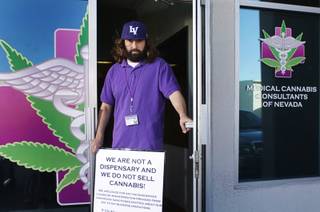
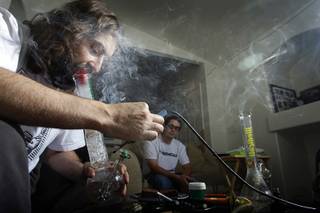
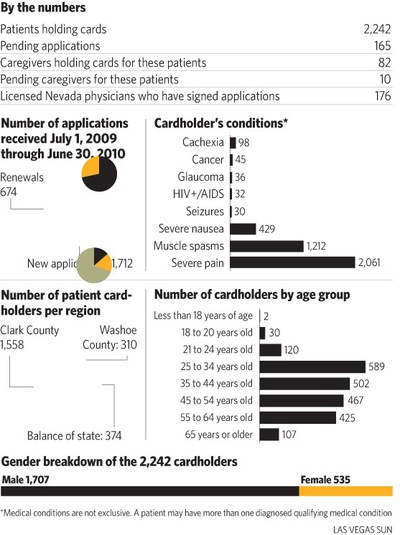

Join the Discussion:
Check this out for a full explanation of our conversion to the LiveFyre commenting system and instructions on how to sign up for an account.
Full comments policy